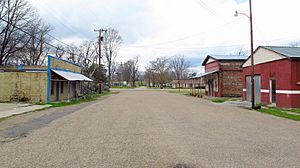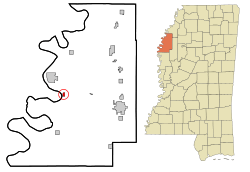Beulah, Mississippi facts for kids
Quick facts for kids
Beulah, Mississippi
|
|
|---|---|

Main Street in Beulah
|
|

Location of Beulah, Mississippi
|
|
| Country | United States |
| State | Mississippi |
| County | Bolivar |
| Area | |
| • Total | 0.46 sq mi (1.20 km2) |
| • Land | 0.46 sq mi (1.20 km2) |
| • Water | 0.00 sq mi (0.00 km2) |
| Elevation | 144 ft (44 m) |
| Population
(2020)
|
|
| • Total | 242 |
| • Density | 522.68/sq mi (201.71/km2) |
| Time zone | UTC-6 (Central (CST)) |
| • Summer (DST) | UTC-5 (CDT) |
| ZIP code |
38726
|
| Area code(s) | 662 |
| FIPS code | 28-05820 |
| GNIS feature ID | 2405258 |
Beulah is a small town in Bolivar County, Mississippi, United States. In 2020, about 242 people lived there.
The town is located near Mississippi Highway 1. West of Beulah, you'll find Lake Beulah. This lake is an oxbow lake, which means it was once part of a winding river. The Illinois Central Railroad used to have a train station in Beulah, but that line is no longer used.
Beulah got its name from a Christian song called Beulah Land. This song was a favorite of Frank A. Montgomery, who was one of the first settlers in this part of Bolivar County.
| Top - 0-9 A B C D E F G H I J K L M N O P Q R S T U V W X Y Z |
History of Beulah: A River Town's Story
Beulah has a long and interesting history, especially because of its connection to the Mississippi River.
Early Days and Plantations
In the 1830s, the land southwest of Beulah belonged to a Choctaw family. Later, a man named Charles Clark took ownership. He started a large farm called the Doro Plantation in the late 1840s. This farm grew to be over 5,000 acres (2,000 ha). It was a very successful farm where many people were forced to work. The Doro Plantation continued to operate until 1913.
During this time, the Mississippi River flowed right next to Beulah. The famous writer Mark Twain often visited Charles Clark while he was writing his book Life on the Mississippi.
In 1858, Frank A. Montgomery bought land north of the Doro Plantation. He also started a large farm, and Beulah was one of the small villages on his property.
River Trade and Pearl Buttons
Riverboats used to stop in Beulah, making it a busy place for trade. There was also a thriving industry based on freshwater clams. People would "clam" for these shells, and then use them to make pearl buttons.
Changing Rivers and Declining Industries
During the American Civil War in 1863, soldiers from the Union army changed the path of the Mississippi River. They built a new channel to avoid the bend near Beulah. This change cut Beulah off from the main river.
Because of this, the pearl button industry started to decline. Freshwater clams prefer the bends of rivers, so they became harder to find. Even today, some families still gather clams where they can reach the river. Changing the river's course also led to the decline of nearby towns like Prentiss and Napoleon.
Beulah as a County Seat
In 1866, Frank Montgomery gave the village of Beulah to the county. He also donated money to build a courthouse. A small log jail was also built. For a time, Beulah became the first county seat, which means it was the main town for county government.
Beulah had a Masonic Lodge, a church, a school, a bank, stores, and a post office. The Bolivar Times newspaper was also published there. However, in 1872, the county seat was moved to Floreyville, which is now called Rosedale.
Life After the Civil War
After the Civil War, many freed people bought and cleared land away from the river. But by 1910, many had lost their land due to tough financial and social conditions. This meant they had to work as sharecroppers or laborers.
In the early 1900s, thousands of African Americans left Mississippi. This was part of the Great Migration. They traveled north by train to cities like Chicago to find new opportunities. However, many others stayed in Beulah, keeping strong ties to their community.
Beulah in Arts and Film
The famous blues musician W. C. Handy once invited Charley Patton, another blues artist, to watch his band play in Beulah. Patton noticed that Handy's musicians read sheet music very strictly. This made Patton decide he didn't want to play with their band.
Beulah was also mentioned in a story by writer Eudora Welty called Death of a Traveling Salesman. Part of the movie Crossroads (1986) was also filmed in Beulah.
Geography and Climate
Beulah covers an area of about 0.5 square miles (1.2 km2), and all of it is land.
What is Beulah's Climate Like?
The weather in Beulah is usually hot and humid in the summer. Winters are generally mild to cool. According to the Köppen Climate Classification system, Beulah has a humid subtropical climate. This type of climate is often called "Cfa" on climate maps.
Population and People
Beulah's population has changed over the years. Here's a look at how many people have lived there:
| Historical population | |||
|---|---|---|---|
| Census | Pop. | %± | |
| 1930 | 506 | — | |
| 1940 | 347 | −31.4% | |
| 1950 | 342 | −1.4% | |
| 1960 | 421 | 23.1% | |
| 1970 | 443 | 5.2% | |
| 1980 | 431 | −2.7% | |
| 1990 | 460 | 6.7% | |
| 2000 | 473 | 2.8% | |
| 2010 | 348 | −26.4% | |
| 2020 | 242 | −30.5% | |
| U.S. Decennial Census 2010 2020 |
|||
Who Lives in Beulah? (2020 Census)
The 2020 census shows the different groups of people living in Beulah.
| Race / Ethnicity | Pop 2010 | Pop 2020 | % 2010 | % 2020 |
|---|---|---|---|---|
| White alone (NH) | 25 | 13 | 7.18% | 5.37% |
| Black or African American alone (NH) | 317 | 218 | 91.09% | 90.08% |
| Native American or Alaska Native alone (NH) | 0 | 1 | 0.00% | 0.41% |
| Asian alone (NH) | 2 | 4 | 0.57% | 1.65% |
| Pacific Islander alone (NH) | 0 | 0 | 0.00% | 0.00% |
| Some Other Race alone (NH) | 0 | 0 | 0.00% | 0.00% |
| Mixed Race/Multi-Racial (NH) | 0 | 3 | 0.00% | 1.24% |
| Hispanic or Latino (any race) | 4 | 3 | 1.15% | 1.24% |
| Total | 348 | 242 | 100.00% | 100.00% |
Education in Beulah
Students in Beulah attend schools that are part of the West Bolivar School District.
See also
 In Spanish: Beulah (Misisipi) para niños
In Spanish: Beulah (Misisipi) para niños
 | Georgia Louise Harris Brown |
 | Julian Abele |
 | Norma Merrick Sklarek |
 | William Sidney Pittman |


